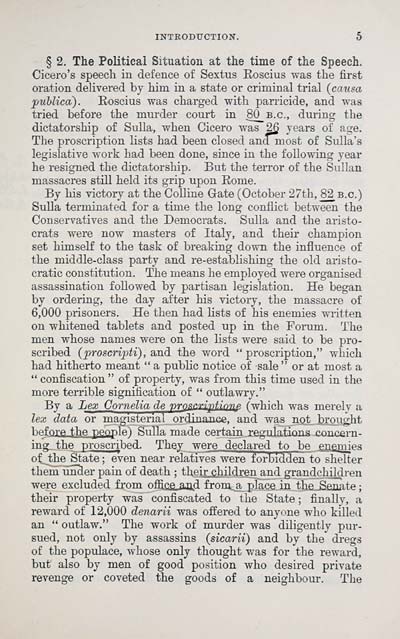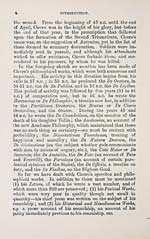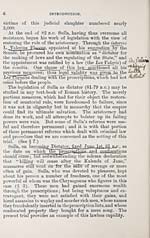Download files
Complete book:
Individual page:
Thumbnail gallery: Grid view | List view

INTRODUCTION. 5
§ 2. The Political Situation at the time of the Speech.
Cicero's speech in defence of Sextus Eoscius was the first
oration delivered by him in a state or criminal trial (causa
publica). Eoscius was charged -vvith parricide, and -n-as
tried before the murder court in 80_b.c., during the
dictatorship of Sulla, when Cicero was 2§ years of age.
The proscription lists had been closed ancrrnost of Sulla's
legislative work had been done, since in the following year
he resigned the dictatorship. But the terror of the Sullan
massacres still held its grip upon Eome.
By his victory at the Colline G-ate (October 27th, 82 b.c.)
Sulla terminated for a time the long coniiict between the
Conservatives and the Democrats. SuUa and the aristo-
crats were now masters of Italy, and their champion
set himself to the task of breaking down the influence of
the middle-class party and re-establishing the old aristo-
cratic coustitution. The means he employed were organised
assassination followed by partisan legislation. He began
by ordering, the day after his victory, the massacre of
6,000 prisoners. He then had lists of his euemies written
on whitened tablets and posted up in the Forum. The
men whose names were on the lists were said to be pro-
scribed {proscripti) , and the word " proscription," which
had hitherto meant " a public notice of sale " or at most a
" confiscation " of property, was from this time used in the
more terrible signification of " outlawry."
By a Lex Cornelia de 'prnsr.riptiqtfi^f (which was merely a
lex data or ■ma.gisfprial nr rlinaTip-e , and was not brgught
bef oi-e the p^ o p le^ SuUa made certain regulations concern-
ing_ the proscribed. They w ere declared to b e ene.iiii es
of the State ; even near relatives were forbidden to shelter
them uncler pain of death ; their^hildren and grandchildren
were excluded from ofl&(ig.^d from, a place in the ^mate ;
their property was confiscated to the State ; finally, a
reward of 12,000 denarii was offered to anyime who killed
an " outlaw." The work of murder was dHigently pur-
sued, not only by assassins (sicarii) and by the dregs
of the populace, whose only thought v/as for the reward,
but also by men of good position who desired private
revenge or coveted the goods of a neighbour. The
§ 2. The Political Situation at the time of the Speech.
Cicero's speech in defence of Sextus Eoscius was the first
oration delivered by him in a state or criminal trial (causa
publica). Eoscius was charged -vvith parricide, and -n-as
tried before the murder court in 80_b.c., during the
dictatorship of Sulla, when Cicero was 2§ years of age.
The proscription lists had been closed ancrrnost of Sulla's
legislative work had been done, since in the following year
he resigned the dictatorship. But the terror of the Sullan
massacres still held its grip upon Eome.
By his victory at the Colline G-ate (October 27th, 82 b.c.)
Sulla terminated for a time the long coniiict between the
Conservatives and the Democrats. SuUa and the aristo-
crats were now masters of Italy, and their champion
set himself to the task of breaking down the influence of
the middle-class party and re-establishing the old aristo-
cratic coustitution. The means he employed were organised
assassination followed by partisan legislation. He began
by ordering, the day after his victory, the massacre of
6,000 prisoners. He then had lists of his euemies written
on whitened tablets and posted up in the Forum. The
men whose names were on the lists were said to be pro-
scribed {proscripti) , and the word " proscription," which
had hitherto meant " a public notice of sale " or at most a
" confiscation " of property, was from this time used in the
more terrible signification of " outlawry."
By a Lex Cornelia de 'prnsr.riptiqtfi^f (which was merely a
lex data or ■ma.gisfprial nr rlinaTip-e , and was not brgught
bef oi-e the p^ o p le^ SuUa made certain regulations concern-
ing_ the proscribed. They w ere declared to b e ene.iiii es
of the State ; even near relatives were forbidden to shelter
them uncler pain of death ; their^hildren and grandchildren
were excluded from ofl&(ig.^d from, a place in the ^mate ;
their property was confiscated to the State ; finally, a
reward of 12,000 denarii was offered to anyime who killed
an " outlaw." The work of murder was dHigently pur-
sued, not only by assassins (sicarii) and by the dregs
of the populace, whose only thought v/as for the reward,
but also by men of good position who desired private
revenge or coveted the goods of a neighbour. The
Set display mode to: Large image | Transcription
Images and transcriptions on this page, including medium image downloads, may be used under the Creative Commons Attribution 4.0 International Licence unless otherwise stated. ![]()
| Early Gaelic Book Collections > Matheson Collection > Pro S. Roscio Amerino > (13) |
|---|
| Permanent URL | https://digital.nls.uk/76502475 |
|---|
| Description | Items from a collection of 170 volumes relating to Gaelic matters. Mainly philological works in the Celtic and some non-Celtic languages. Some books extensively annotated by Angus Matheson, the first Professor of Celtic at Glasgow University. |
|---|
| Description | Selected items from five 'Special and Named Printed Collections'. Includes books in Gaelic and other Celtic languages, works about the Gaels, their languages, literature, culture and history. |
|---|

